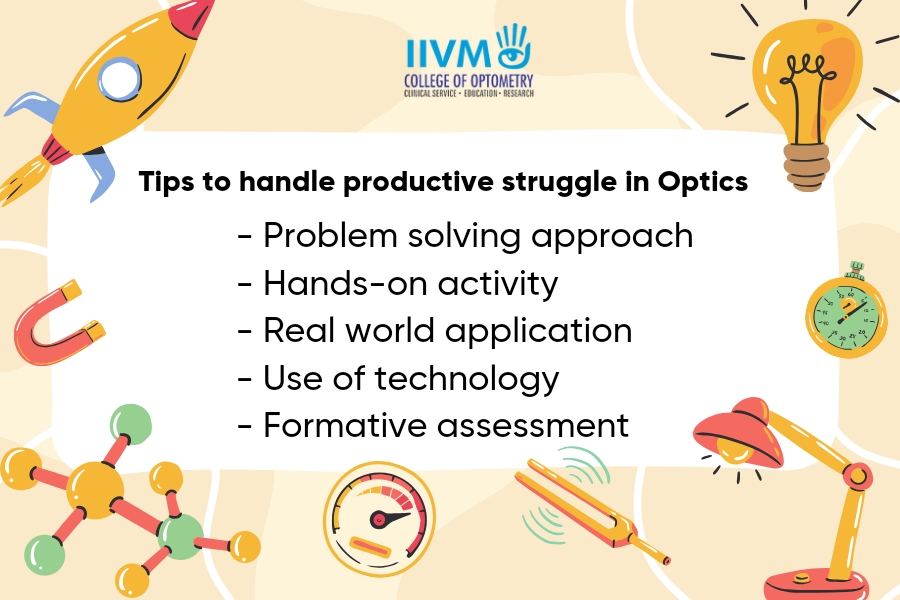Supporting productive struggles in Optics
- Productive struggle involves developing strong habits such as perseverance and flexible thinking, rather than simply seeking the correct solution.
- Supporting productive struggle in optics creates an environment that encourages learners to engage with challenging concepts and problems, viewing challenges as opportunities for growth.
- Here, we present strategies that aid in promoting productive struggle in optics.
“At IIVM College of Optometry, we empower learners to view challenges not as obstacles but as opportunities for excellence and personal advancement”
1. PROBLEM-SOLVING APPROACHES:
- Present open-ended and real-world daily life activity-based problems in optics.
- Break down complex problems into smaller, more manageable parts, allowing students to tackle them step by step.
- Encourage creative thinking beyond conventional solutions.
2. HANDS-ON ACTIVITY:
- Experimentation facilitates understanding optical concepts through practical application and their working principles.
- Provide hands-on training and activities that allow students to observe and explore optical phenomena.
- Enable students to construct optical devices like lenses and telescopes, troubleshooting issues during the process.
- Integrate reflective practices into the learning process, encouraging students to journal their thoughts, document problem-solving strategies, and reflect on lessons learned from the struggle.
3. REAL-WORLD APPLICATION:
- Connect optics concepts to real-world applications (e.g., prism separating white light into seven colors due to chromatic aberration).
- Assign activity-based projects related to daily life routines involving optics (e.g., analyzing spectacle lenses with both reflective and refractive properties).
- Organize group projects where students collaboratively solve optics-related problems.
4. USE OF TECHNOLOGY:
- Utilize simulations and virtual experiments to allow students to visualize and interact with optical phenomena in a controlled environment.
- Integrate educational apps and software to enhance the learning experience and engagement.
5. FORMATIVE ASSESSMENT:
- Implement formative assessments that provide feedback during the learning process, identifying areas where students may be struggling and enabling timely intervention.
- These assessments serve as valuable learning tools, offering opportunities for students to learn from their mistakes and improve.

Visit our campus or explore our website or contact us +91 98431 16339 to learn more about how IIVM College of Optometry can be your gateway to a dynamic and successful career in optometry.
Embrace productive struggle and excellence in learning – Choose IIVM College of Optometry!


